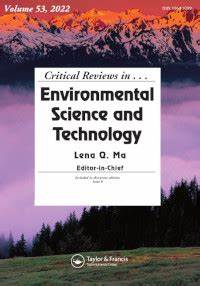厌氧消化系统中的病毒:多样性、作用和未来前景
IF 13.2
1区 环境科学与生态学
Q1 ENVIRONMENTAL SCIENCES
Critical Reviews in Environmental Science and Technology
Pub Date : 2025-06-18
DOI:10.1080/10643389.2025.2457980
引用次数: 0
摘要
在过去的几十年里,厌氧消化(AD)作为一种将废物转化为沼气、生物氢和挥发性脂肪酸(VFAs)的高效生物过程受到了持续的关注。鉴于阿尔茨海默病微生物组的复杂性,探索执行阿尔茨海默病过程的微生物,特别是病毒是重要的,迄今为止尚未得到足够的重视。随着新的分子技术和元组学方法的出现,确定AD系统中涉及的病毒群落的细节变得更加容易。这是很重要的,因为它可以帮助我们监测和调节提高AD过程稳定性的因素,以实现像甲烷这样的选择性生物产品。本文综述了AD系统中独特的病毒群落及其可能与其他微生物群落的相互作用。它还强调了这些病毒群落,特别是噬菌体,是如何塑造AD微生物群落的。进一步讨论了辅助代谢基因在AD病毒中的作用。最后,本文综述了病毒对甲烷生成的影响,并强调了在AD中研究病毒的挑战和未来前景。本文章由计算机程序翻译,如有差异,请以英文原文为准。
Viruses in anaerobic digestion systems: Diversity, role and future prospects
Anaerobic digestion (AD) has received continuous attention over the past few decades as an efficient biological process for converting waste materials into biogas, biohydrogen, and volatile fatty acids (VFAs). Given the intricacy of the AD microbiome, it is important to explore the microorganisms carrying out the AD process, especially the viruses, which have received insufficient attention thus far. With the advent of novel molecular techniques and meta-omics approaches, it has become more accessible to ascertain the details of viral communities involved in AD systems. This is important as it could help us in monitoring and regulating the factors for improving AD process stability to achieve a selective bio-product like methane. This review highlights the distinctive viral communities in AD systems and their possible interactions with other microbial communities. It also highlights how these viral communities, particularly phages, are shaping the AD microbial communities. Furthermore, the role of auxiliary metabolic genes in AD viruses is discussed. Finally, the review provides insights into the effect of viruses on methanogenesis and highlights the challenges and future perspectives of studying viruses in AD.
求助全文
通过发布文献求助,成功后即可免费获取论文全文。
去求助
来源期刊
CiteScore
27.30
自引率
1.60%
发文量
64
审稿时长
2 months
期刊介绍:
Two of the most pressing global challenges of our era involve understanding and addressing the multitude of environmental problems we face. In order to tackle them effectively, it is essential to devise logical strategies and methods for their control. Critical Reviews in Environmental Science and Technology serves as a valuable international platform for the comprehensive assessment of current knowledge across a wide range of environmental science topics.
Environmental science is a field that encompasses the intricate and fluid interactions between various scientific disciplines. These include earth and agricultural sciences, chemistry, biology, medicine, and engineering. Furthermore, new disciplines such as environmental toxicology and risk assessment have emerged in response to the increasing complexity of environmental challenges.
The purpose of Critical Reviews in Environmental Science and Technology is to provide a space for critical analysis and evaluation of existing knowledge in environmental science. By doing so, it encourages the advancement of our understanding and the development of effective solutions. This journal plays a crucial role in fostering international cooperation and collaboration in addressing the pressing environmental issues of our time.

 求助内容:
求助内容: 应助结果提醒方式:
应助结果提醒方式:


